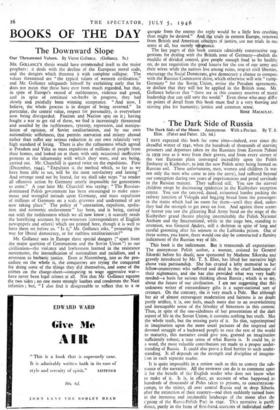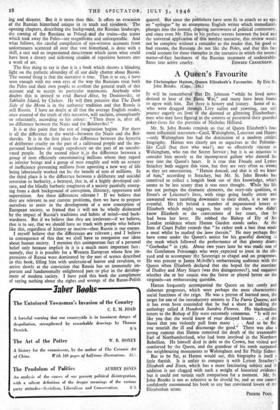- 4 The Dark Side of Russia
The Dark Side of the Moon. Anonymous. With a Preface. By T. S. Eliot. (Faber and Faber. 12s. 6d.)
I HAVE expected this book, for some time—indeed, ever since the dreadful winter of 1941, when the hundreds of thousands of starving prisoners and deportees taken by the Russians from Eastern Poland in 1939 rose as it were from their graves, and from every corner of the vast Eurasian plain converged incredibly upon the Polish Embassy in Kuibyshev, tojoin the new Polish army being formed on Russian soil. These unfortunates, men, Women and children (it was not only the men who came to join the army), had suffered beyond our conception during two years of imprisonment and penal servitude in the Russian manner. They suffered still. You saw the starved children swept by decimating epidemics in. the Kuibyshev reception centre. You saw the tattered, dazed, exhausted hordes packing the railway junction of Vologda and begging bread from the passengers in the trains which had no room for them—until they died, unless they had the strength to get away on foot. And against these scenes of horror you saw the glittering Red Army band on the stage of the Kuibyshev grand theatre playing interminably the Polish National Anthem and the International, while in the stage latix, standing to attention, was General Avders, still a skeleton in spite of long and careful grooming after his sojourn in the Lubianka prison. Out of these scenes, you knew, there would one day be constructed a flaming indictment of the Russian way of life.
This book is the indictment. But it transcends all expectations. The anonymous Polish author, a woman, assisted by General Sikorski before his death;' now sponsored by Madame Sikorska and gravely introduced by Mr. T. S. Eliot, has lifted her narrative high above vain partisanship. - She has created a lofty memorial- to her fellow-countrymen who suffered and died in the cruel landscape- of their nightmares, and she- has also provided what was very badly needed—a basis for serious thinking about Russia ; which is to say, about the future of our civilisation. I am not suggesting that this unknown writer of extraordinary gifts is a super-national sort of creature. On the contrary, she is very much a Pole. But although her air of almost extravagant moderation and fairness is no doubt partly artifice, it is, one feels, much more due to an overwhelming and inescapable sense of the frivolity of bitterness in this context. Thus, in spite of the one-sidedness of her presentation of the dark aspect of life in the Soviet Union, it contains nothing but truth. Not the whole truth, but the missing parts of it. So that, superimposed in imagination upon the more usual pictures of the inspired and devoted struggle of a backward people to race the rest of the world to maturity, this narrative could give you, granted an imagination sufficiently robust, a true sense of what Russia is. It could be, in a word, the most valuable contribution yet made to a proper under- standing of Russia. It could also prove a final barrier to such under- standing. It all depends on the strength and discipline of imagina- tion in each separate reader.
It is quite impossible in a review such as this to convey the sub- stance of the narrative. All the reviewer can do is to comment upon it for the benefit of the -English reader who does not know what to make of it. It is, in effect, an account of what happened „„to hundreds of thousands" of . Poles taken to prisons, to concentration- camps, to the mines, all over central Russia and in deep Siberia, after the extinction of their country—and then suddenly turned loose in the immense, and intolerable landscape of the moon after the sgning of the Russo-Polish Pact in 1941. This narrative is partly direct, partly in the form of first-hand, accounts of individual suffer- ing and disaster. But it is more than this. It offers an evocation of the Russian hinterland unique in its truth and vividness. The opening chapters, describing the background, the Russian landscape, the corning of the Russians to Poland and the trains—the trains which took away the Poles—are magnificent and unforgettable. And what follows, the careful compilation of eye-witness accounts from unfortunates scattered all over that vast hinterland, is done with a skill, a tact and an impassioned detachment which turns what could have been a dreary and sickening citation of repetitive horrors into a work of art.
The first thing to say is that it is a book which throws a blinding light on the pathetic absurdity of all our daily chatter about Russia. The second thing is that the narrative is true. That is to say, I have seen enough with my own eyes of the way the Russians treat both the Poles and their own people to confirm the general truth of this account and to accept its particular statements. Anybody who doubts this is invited to read Buried Alive, by Dostoievsky, or Sakhalin Island, by Chekov. He will then perceive that The Dark Side of the Moon is in the authentic tradition and that Russia is still Russia. I have no doubt at all that the average English reader, once assured of the truth of this narrative, will exclaim, triumphantly or reluctantly, according to his colour: " Then there is, after ail, no difference between the Nazis and the Bolsheviks! "
It is at this point that the test of imagination begins. For there is all the difference in the world—between the Nazis and the Bol- sheviks. It is in the first place the difference between the hysteria of deliberate cruelty on the part of a cultivated people and the im- personal harshness of rough expediency on the part of an unculti- vated people. In the second place it is the difference between a group of men efficiently exterminating millions whom they regard as inferior beings and a group of men roughly and with an ecstasy of inefficiency preventing millions from upsetting a new way of life being laboriously worked out fo,- the benefit of tens of millions. In the third place it is the difference between a deliberate and suicidal reversion to barbarity, a betrayal, that is, of a highly developed cul- ture, and the blindly barbaric roughness of a society painfully emerg- ing from a dark background of corruption, illiteracy, oppression and superstition. Arc these differences relevant ? If we believe that they are relevant to our current problems, then we have to prepare ourselves to assist in the development of a new conception of European society, so framed that it will not be wholly dislocated by the impact of Russia's traditions and habits of mind—and back- wardness. But if we believe that they are irrelevant—if we believe, that is to say, that we should have no truck with people who behave like this, regardless of history or motive—then Russia is our enemy. I myself believe that the differences are relevant ; and I believe in consequence of this that we shall have to reorganise our ideas about human society. I mention this unimportant fact of a personal belief only because implicit in it is a much more important fact: namely, that it is possible for a Western European whose first im- pressions of Russia were dominated by the sort of scenes described in this book, filling him with undreamt-of horror and revulsion, to arrive slowly at the conviction that Russia has an immensely im- portant and fundamentally enlightened part to play in the develop- ment of modem society. I have paid this book the compliment of saying nothing about the rights and wrongs of the Russo-Polish quarrel. But since the ptiblishers have seen fit to attach to an epic an " epilogue " by an anonymous English writer which immediately plunges into the normal, chltating narrowness of political controversy, and since even Mr. Eliot in his preface wavers between the local and the universal-application of this sombre narrative, this review would not be complete without a reminder to the reader that, for good or bad reasons, the Russians do not like the Poles, and that this fact could account for those examples in the narrative in which the normal matter-of-fact harshness of the Russian treatment of undesirables



























 Previous page
Previous page